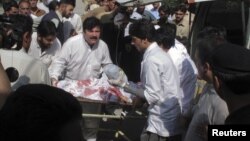ISLAMABAD —
ISLAMABAD — This week's Taliban shooting of a Pakistani girl made headlines and drew worldwide condemnation. The militant group said it targeted the young activist for being "pro-West" and speaking out against the Taliban. Pakistani analysts said years of economic hardship and weak state institutions have given such extremists more opportunities to recruit and operate.
According to the International Crisis Group, the combination of conflict and flood-induced hardships, government failure, as well as restrictions on international and local non-profit groups is creating a crisis situation in Pakistan.
The group’s analyst Samina Ahmed said radical Islamist organizations are taking advantage of local economic hardship and the resulting anger and alienation to recruit new members and expand their influence.
Ahmed acknowledged the civilian Pakistani government has made some progress, but says there are still huge gaps in state delivery. She said even banned terrorist groups are still operating in certain areas, under new names.
“The Lashkar-e-Taiba, the renamed Jamaat-ud-Dawa, is very active in areas where it can then exploit people who are in absolute dire need of assistance, it can exploit their needs to then penetrate the area, to broaden their support through its charity fronts,” said Ahmed.
Ahmed warned that unless the weight of the law is thrown at these violent extremists, then these groups will become even more dangerous.
Lawmaker and parliamentary secretary for Pakistan's foreign ministry Palwasha Khan argued that Pakistan, which emerged from military rule just five years ago, is doing its best in the face of multiple challenges.
“We are in a state of war, and nations and countries that are in state of war naturally do have such problems,” said Khan, adding that Pakistan’s fight against terrorists, in which hundreds of militants and soldiers have died, has cost the country dearly.
“The international community has to realize the fact that we’ve lost civilians, we’ve lost our economy, and this is a direct repercussion of the war,” Khan said.
One of the latest civilians to suffer the consequences is teenage activist Malala Yousafzai, shot in the head in a brazen attack by the Taliban on Tuesday. Yousafzai was an outspoken supporter of girls’ education.
The 14-year old girl is currently recuperating in a military hospital near the capital, Islamabad.
According to the International Crisis Group, the combination of conflict and flood-induced hardships, government failure, as well as restrictions on international and local non-profit groups is creating a crisis situation in Pakistan.
The group’s analyst Samina Ahmed said radical Islamist organizations are taking advantage of local economic hardship and the resulting anger and alienation to recruit new members and expand their influence.
Ahmed acknowledged the civilian Pakistani government has made some progress, but says there are still huge gaps in state delivery. She said even banned terrorist groups are still operating in certain areas, under new names.
“The Lashkar-e-Taiba, the renamed Jamaat-ud-Dawa, is very active in areas where it can then exploit people who are in absolute dire need of assistance, it can exploit their needs to then penetrate the area, to broaden their support through its charity fronts,” said Ahmed.
Ahmed warned that unless the weight of the law is thrown at these violent extremists, then these groups will become even more dangerous.
Lawmaker and parliamentary secretary for Pakistan's foreign ministry Palwasha Khan argued that Pakistan, which emerged from military rule just five years ago, is doing its best in the face of multiple challenges.
“We are in a state of war, and nations and countries that are in state of war naturally do have such problems,” said Khan, adding that Pakistan’s fight against terrorists, in which hundreds of militants and soldiers have died, has cost the country dearly.
“The international community has to realize the fact that we’ve lost civilians, we’ve lost our economy, and this is a direct repercussion of the war,” Khan said.
One of the latest civilians to suffer the consequences is teenage activist Malala Yousafzai, shot in the head in a brazen attack by the Taliban on Tuesday. Yousafzai was an outspoken supporter of girls’ education.
The 14-year old girl is currently recuperating in a military hospital near the capital, Islamabad.





